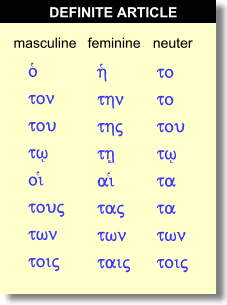An article is subset of the adjective. It therefore limits a noun. It is the most colourless of all the adjectives.
English has two kinds of articles:
- definite (the) for singular or plural nouns
- indefinite (a, an) for singular nouns only
Greek has only the definite article. The following chart provides the full list of definite articles.

![]()
If there
is no article expressed, translate the English noun with the indefinite article
(a, an) if it is singular. If it is plural, then English and Greek are identical,
neither having an indefinite article in the plural.
Note the following exception: the predicate nominative has no article, even if definite, when the subject has an article.
![]()
Pay special attention to the article when translating. After a few weeks of
studying Greek, you will be able to recognize all the definite articles in
a Greek text. About half the nouns in a sentence will be definite. The presence
of the article indicates the presence of a noun (or noun-like thing) nearby,
usually immediately following the article. Nouns can sometimes be more difficult
to recognize (especially third declension nouns). Use the much more simple
article to help identify a noun and to indicate its case, number and gender.



